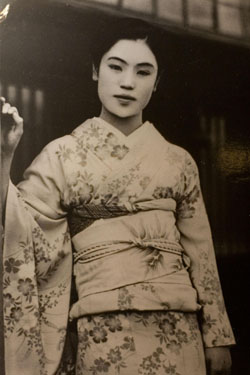Monday, January 5, 2015
Friday, December 12, 2014
Monday, December 1, 2014
「昭和の棋聖」の死
きのう、私の好きな棋士(きし)呉清源(ご せいげん、1914年6月12日 - 2014年11月30日)はしにました。それはしゃしんです。
(星、三三、天元)
(ほし、さんさん、てんげん)
呉清源は中国(ちゅうごく)人でした。でも、日本人となりましたから、たくさん中国人は呉清源がきらいました。ナショナリズムはおろかなです。とてもざんえんですね。呉清源が安らかに眠る。
Friday, November 14, 2014
Paganini Caprice No.24 by 石川綾子
As you would often hear from people who share these kinds of videos, "I wish I kept playing the violin." The more jaded among you are probably already shaking your head.
What else can I wish for? That Princeton didn't exist? That money didn't exist? That women didn't exist? That I know what I want? I would pay my life for the lattermost. The lattermost is the difference between Ishikawa and me.
Enjoy.
Monday, November 3, 2014
雪国(ゆきぐに)
川端康成(かわばたやすなり)がとてもすきです。かれは雪国(ゆきぐに)をかいた、雪国はいいほんです。そして、ふるいほんです。わたしはにほんごをよみませんでした。でも、ちゅうごくごのほんやくとえいごのほんやくをよみました。雪国はとてもうつくしいです。雪国もとめもつうれつです。ほんとにすきです。
雪国
川端康成
松栄(駒子のモデル)
Matsuei (onsen geisha on which the character Komako was based)
I once wrote about Snow Country for Columbia adcoms. For the English readers:
“Beauty is that which induces pleasure.” As soon as Mr. Pirie introduced Kierkegaard’s position on beauty in that cozy afternoon class, I knew Kierkegaard would’ve been my perfect reading buddy. I seek nothing but beauty when reading for pleasure, and Snow Country by Yasunari Kawabata is the most meaningful novel I’ve read because it’s the most beautiful.
Kawabata tells a simple tale free of contrivances. Painting the image of a hot spring town in wintertime with delicate brushstrokes, he immerses me in the surreal beauty of snow country. His economy of language and accretion of details infuses the detached narrative with an intangible force, dragging me into a torrent of poignancy. As protagonist Shimamura vacillates between rational judgment and emotional impulse in his fragile affair with Komako, an onsen geisha who despite her identity emanates the purity of snow under Kawabata’s pen, I can’t help but feel Shimumura’s delicious torment.
Kawabata brands “wasted effort” on the hopeless infatuation between Shimamura and Komako time and again, but as much as I am saddened by their inevitable parting, I am roused by their fervent pursuit of beauty. The relationship. Shimamura’s unpublished essays on occidental ballet. Komako’s learning samisen from the radio. So what if nothing is accomplished? The beauty experienced in the process, albeit ephemeral, is real.
Generations of mathematicians spent their lives parsing the mystery of the Riemann Hypothesis and failed. The novel’s translator Edward Seidensticker, who taught alongside Donald Keene until retiring in 1985, admitted flawless translation is impossible. Yet in their lifelong pursuit of beauty, these people found fulfilment that transcended the ends they never achieved.
Through a novel beautiful in itself, Kawabata inspires me to pursue beauty in life without dwelling on the possibility of failure. There’s not enough time for hesitation.
Sunday, November 2, 2014
Reflection & New Goal Statement
Reflection:
I have achieved my goal to improve my Japanese word pitch and phrasal intonation. Among my planned activities, I have watched the videos on cengage and repeated after the dialogue. However, I only had enough time to shadow for one 10-minute period each week.
Goals:
To continue improving my Japanese word pitch and phrasal intonation
To maintain first goal at higher speeds
Activities:
Watch videos on cengage
Shadow for 10-minutes every week
Sing a Japanese song when I encounter one I like
Go to Japanese language table twice a month
I have achieved my goal to improve my Japanese word pitch and phrasal intonation. Among my planned activities, I have watched the videos on cengage and repeated after the dialogue. However, I only had enough time to shadow for one 10-minute period each week.
Goals:
To continue improving my Japanese word pitch and phrasal intonation
To maintain first goal at higher speeds
Activities:
Watch videos on cengage
Shadow for 10-minutes every week
Sing a Japanese song when I encounter one I like
Go to Japanese language table twice a month
Sunday, October 19, 2014
雪の華
にほんのミュージックわとてもすきです。そして、にほんのうたをうたった。The song is 雪の華 (Yuki no Hana) by 中島美嘉 (Nakashima Mika)。
I recorded a part of this song for PE 5, then decided to record the whole song since I liked it so much. Lyrics are as follows:
雪の華
のびた人陰(かげ)を舗道にならべ
夕闇のなかを君と歩いてる
手をつないでいつまでもずっと
そばにいれたなら
泣けちゃうくらい
風が冷たくなって
冬の匂いがした
そろそろこの街に
君と近付ける季節がくる
今年、最初の雪の華を
ふたり寄り添って
眺めているこの瞬間(とき)に
幸せがあふれだす
甘えとか弱さじゃない
ただ、君を愛してる
心からそう思った
君がいるとどんなことでも
乗りきれるような気持ちになってる
こんな日々がいつまでもきっと
続いてくことを祈っているよ
風が窓を揺らした
夜は揺り起こして
どんな悲しいことも
僕が笑顔へと変えてあげる
舞い落ちてきた雪の華が
窓の外ずっと
降りやむことを知らずに
僕らの街を染める
誰かのために何かを
したいと思えるのが
愛ということを知った
もし、君を失ったとしたなら
星になって君を照らすだろう
笑顔も涙に濡れてる夜も
いつもいつでもそばにいるよ
今年、最初の雪の華を
ふたり寄り添って
眺めているこの瞬間(とき)に
幸せがあふれだす
甘えとか弱さじゃない
ただ、君とずっと
このまま一緒にいたい
素直にそう思える
この街に降り積もってく
真っ白な雪の華
ふたりの胸にそっと想い出を描くよ
これからも君とずっと
Various English translations are available online; I hope you like my cover of the song.
Subscribe to:
Posts (Atom)





